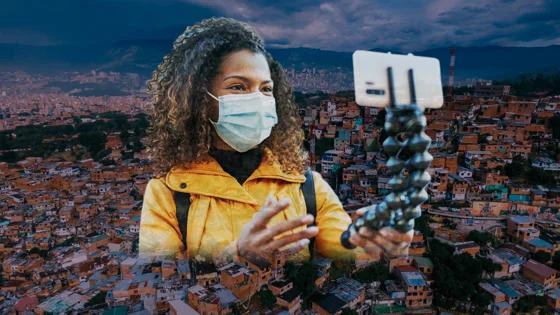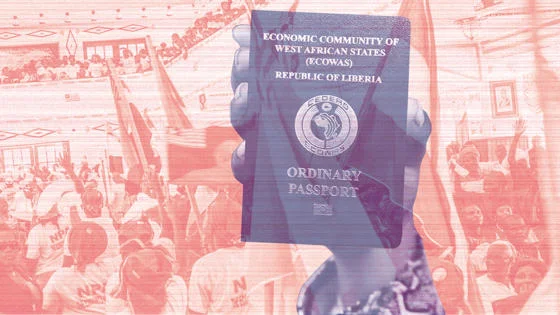Citizens of nowhere? The struggles facing Bolivian migrants in Chile

Contents
Why do some people struggle to establish secure lives after migrating to a new country, and what can we learn about the ways certain groups are excluded from areas of society through its citizenship practices? These are among the questions explored by Dr Megan Ryburn, a British Academy Postdoctoral Fellow at LSE’s Latin America and Caribbean Centre, in her book Uncertain Citizenship.
Based on multi-sited ethnographic fieldwork, the book explores the experiences of low-wage Bolivian migrants in Chile - individuals and families who have moved to try and carve out a more sustainable life than the one experienced at home, only to find themselves again in positions of financial and legal insecurity.
Chile has experienced a migration "boom", from around 115,000 migrants in the early 1990s to over 1.25 million, making migration a hot topic, and the country a fertile ground to explore the attitudes and barriers that migrants face in daily life. While Uncertain Citizenship focuses on the ways Bolivian migrants in Chile experience citizenship in their everyday lives, Dr Ryburn is now expanding her research to work with Colombian migrants in the country.
The people I worked with face multiple exclusions when it comes to trying to access vital services... caused by, and exacerbated by, racism or xenophobia.
Citizenship laws can exacerbate the marginalisation of certain groups in society
"Citizenship is one of the most important mechanisms to indicate our belonging in a society at its most basic level," she explains. "And when we look at migration and citizenship together, we see how contradictory citizenship can be, and we can learn a lot about the inclusions and exclusions that migrants face in establishing lives in new places.
"Many of the migrants I spoke to were facing barriers as non-citizens in trying to access services that we would consider a human right, such as access to healthcare, education, decent work or social support. These barriers show us who we consider to be part of our society and who we consider to be outside of our society."
Dr Ryburn has been interested in the experiences of migrants in Chile since she began part-time voluntary work in Santiago de Chile in 2010 and 2011, before returning to carry out fieldwork in 2013 and 2014 with Bolivian migrants and in 2018, 2019 and 2020 for her most recent project.
In the early 2010s, although Bolivian migrants were the third or fourth largest group in the country, and potentially the most marginalised, there was a lack of research into their experiences. Examining their experiences through the lens of citizenship rights helps shine a light on the ways migrants are included and areas they are excluded from in Chilean society.
It’s easy to think of citizens as having a level playing field… But those I interviewed had very restricted access to…[their] rights at home.
All citizens are not alike - and citizenship rights protect some more than others
People’s access to citizenship is shaped by their social identities, Dr Ryburn’s findings reveal, with an individual’s race, gender and class all playing a factor in the ease with which they can integrate into society. A Bolivian man with a university degree, she explains, is less likely to experience the patterns of exclusion an indigenous, and lesser-educated Bolivian woman would face. While his transition into Chilean society might be relatively smooth, she would be far more likely to remain on the periphery of legal citizenship, with a more fragile access to necessities such as employment or healthcare.
While the educated Bolivian man might find integrating into Chilean society easier, however, he may still find himself experiencing exclusion as a result of racism or xenophobia, Dr Ryburn highlights. Her interviews with Chileans exposed the prejudices that Bolivian migrants often face, including that Bolivians are "sumisivos" (submissive) or "un poquito más lento" ("a little bit slower") - all views that help explain some of the barriers faced by Bolivian migrants as they work to build new lives.
"The people who I have worked with face multiple exclusions when it comes to trying to access vital services, and this is caused by, and exacerbated by, racism or xenophobia, which also intersects very strongly with gender and class," says Dr Ryburn.
What I find most concerning is the rhetoric around migration, and the way the racism and xenophobia in public discourse then becomes reflected in our policies and in the law.
The picture painted for those in Chile is often one of poverty and struggle, but Dr Ryburn stresses that the lives her interviewees were leaving behind also came with hardship - many having migrated due to being unable to carve out the life they wanted in their homeland, their citizenship providing no real protection, often as a result of who they were.
"It’s easy to think of citizens as having a level playing field – and on paper all citizens do appear equal," she says. "But those I interviewed had, in reality, very restricted access to the rights at home that we would expect to go with their status as citizens. Although they were often marginalised as immigrants because of racism, economic hardship and a lack of legal protection, it’s important to note that these were all issues that played a role in them leaving their homeland in the first place.
"People’s ability to thrive is powerfully contingent on social identities around race, gender, class and so on," she continues. "We can see these inequalities play out amongst citizens in all countries, but this becomes even more clear when we look at citizenship and migration together. At that point those contradictions are really revealed."
Although Dr Ryburn’s research is focused on Chile, there are parallels that can be drawn in other countries, including the UK and US she says, adding: "What I find most concerning is the rhetoric around migration, and the way the racism and xenophobia in public discourse then becomes reflected in our policies and in the law.
"If I could see something change, it would very much be the way in which we talk about migration and citizenship - that we can bring a more human perspective to discussions around the issue. I would also like to see public discourse become more inclusive of migrant voices, because as with many other areas of life at present, they are so often missing from these conversations."
The LSE IQ podcast episode What does it really mean to be a citizen? can also be listened to on LSE Player.
Dr Megan Ryburn was speaking to Jess Winterstein, Deputy Head of Media Relations at LSE.
Image: Alamy
Download a PDF version of this article



